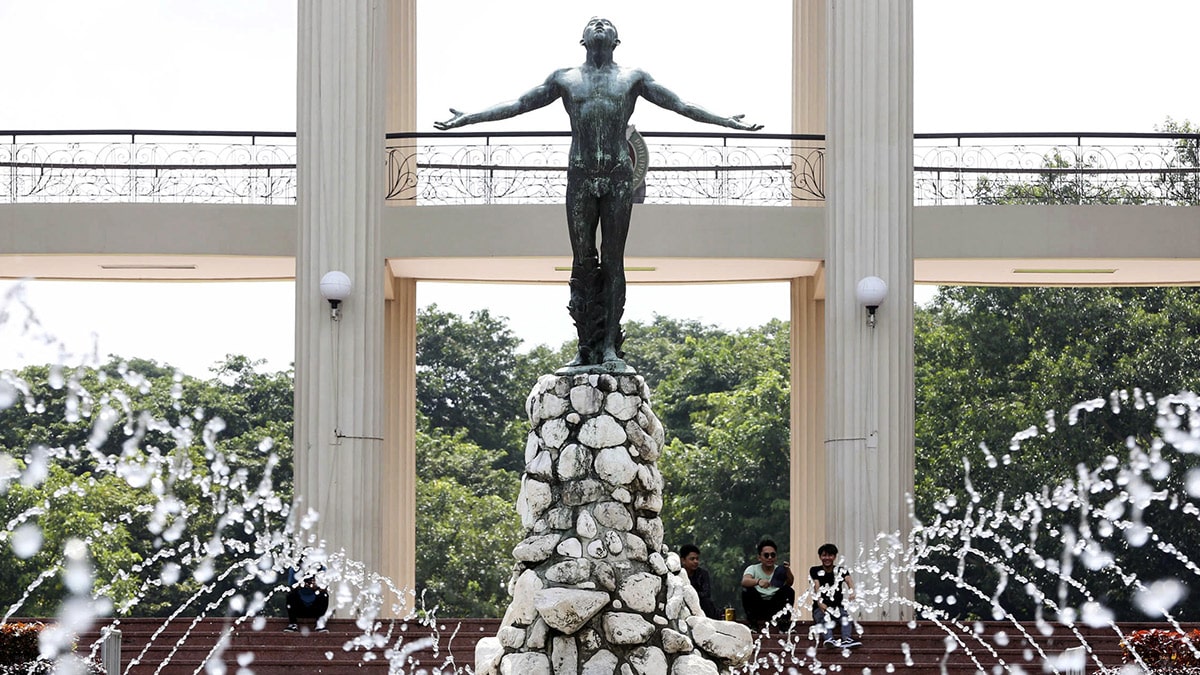UP community denounces accord with military

Inquirer file photo
MANILA, Philippines — Members of the University of the Philippines (UP) community on Saturday condemned an agreement between the state university and the Armed Forces of the Philippines for joint initiatives and sharing of expertise in national security and education.
The “Declaration of Cooperation” was signed on Aug. 8 by UP vice president for academic affairs Leo Cubillan and AFP chief Gen. Romeo Brawner Jr., to strengthen the partnership between the university and the military in “key areas, including strategic studies and educational outreach.”
READ: UP president challenges AFP claim on Reds’ campus infiltration
‘Advancing nat’l security’
In separate posts on its Facebook and Instagram accounts, which it had taken down without explanation, the AFP said the declaration signified the military’s “commitment to advancing national security while fostering intellectual growth and innovation.”
It is “expected to facilitate various initiatives, including joint research projects, academic programs and community engagement activities, with the aim of strategically aligning resources and expertise between the AFP and UP,” the AFP said.
Article continues after this advertisementA copy of the agreement has not been published on the official websites of the AFP and UP when last checked at 8 p.m. on Saturday.
Article continues after this advertisementFor the concerned university members, the declaration could undermine the academic freedom UP has espoused throughout its 116-year history.
“UP purportedly champions fearless scholarship and critical thinking, but its administration now wants to ‘strategically align (its) resources and expertise’ with a coercive institution that we all know has been accused countless times by local and international human rights watchdog groups of trampling on civil liberties in its purported counterinsurgency campaigns and attacks on government critics and dissidents,” said a joint statement by the university’s sectoral regents representing faculty, students and personnel, Kasama sa UP and Defend UP Network.
‘Undemocratic action’
Worse, they pointed out, the agreement would make UP “complicit to human rights violations and political oppression.”
“It also essentially legitimizes ongoing suppression of critical voices and progressive initiatives within the university that the military deems inimical to its notion of ‘national security,’” they added, referring to the military’s Red-tagging and counterinsurgency measures against student activists.
They also cried foul at this latest “undemocratic action” by the UP leadership under university president Angelo Jimenez for not consulting the university community. Jimenez assumed office in February last year.
“This is most despicable and should merit the strongest condemnation from the students, faculty, staff and other community members, including all University Councils in all constituent universities,” the three regents and the other group’s statement said.
UP and the AFP have had an antagonistic relationship for decades, but this was managed under the 1982 Soto-Enrile Accord, which barred the military and the police from entering any of the UP campuses without approval from the school officials to protect the university’s student rights, freedom of expression and academic freedom. This was later reaffirmed by the 1989 UP-Department of National Defense (DND) Accord, signed by then Defense Secretary Fidel Ramos and UP president Jose Abueva. The accord prevents any military or police interference in any of the UP campuses without prior notice to the UP administration.
But in January 2021, then Secretary Delfin Lorenzana unilaterally scrapped the 1989 agreement, saying that it was being used by communist rebels and their supporters to prevent law enforcers from operating against them on UP campuses.
He abrogated the agreement so that the defense establishment could perform its “legal mandate of protecting our youth against CPP-NPA (Communist Party of the Philippines-New People’s Army), recruitment activities, whose design and purpose is (sic) to destroy the democracy we have all fought for.”
In his letter to then UP president Danilo Concepcion, Lorenzana cited “recent events” in which “a number of UP students” were tagged as members of the CPP-NPA.
This was met by stiff resistance from the UP community, including the Office of the Student Regent, which denounced the action “as an attempt to encroach on our academic freedoms and remove safe spaces from our campuses.”
Concepcion, who joined the protests at the time, said Lorenzana’s move was a “nightmare.”
On the same day the declaration was signed, Prospero de Vera III, who cochairs the UP Board of Regents with the UP president, told a congressional budget hearing that the Commission on Higher Education (CHEd), which he chairs, is a member of the National Task Force to End Local Communist Armed Conflict (NTF-Elcac).
De Vera said that the list of agencies included in the task force had been expanded and that “additional members were sworn into office by the President recently,” including CHEd. “That’s why I’m a member of the NTF-Elcac,” he said.
Kabataan Rep. Raoul Manuel questioned the legal basis for expanding the NTF-Elcac membership and why the government did not publicize any amendment or guidelines to the Duterte administration’s Executive Order No. 70 that created the anticommunist task force, which has been identified by critics as the spearhead of the Red-tagging campaign.
“Where is it in the mandate of CHEd that it could cooperate with this kind of task force?” he asked during the budget hearing.
In response, De Vera said their mandate included disseminating information about government programs.
“If the agencies have requests or some activities which need funding, we mobilize the higher education institutions to be venues for information dissemination by government agencies,” he said. —with reports from Faith Argosino and Inquirer Research